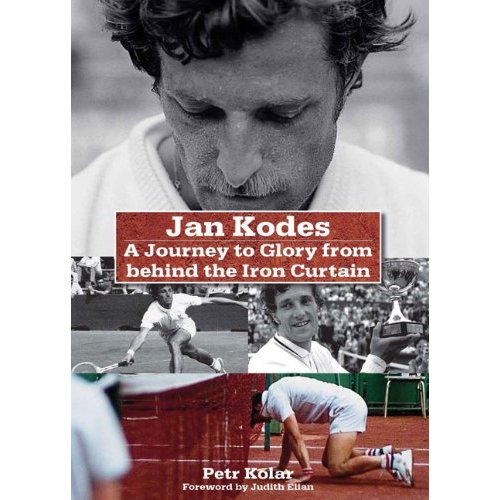It was 40 years ago in Rome that a future member of the International Tennis Hall of Fame reached his first final of an important tournament. Jan Kodes, a Wimbledon and French Open champion and two-time U.S. Open singles finalist, made his way into the first big final of his career, before falling to Ilie Nastase. Kodes, who next to Ivan Lendl can be considered the best Czech men’s player ever, went on to win at Roland Garros shortly after his run in Rome and repeated as French champion in 1971. He won Wimbledon in 1973 and reached the U.S. singles final in 1971 and 1973.
In his book “Jan Kodes: A Journey to Glory from Behind the Iron Curtain” (pre-order the book here: http://www.amazon.com/Jan-Kodes-Journey-Behind-Curtain/dp/0942257685/ref=sr_1_1?ie=UTF8&s=books&qid=1272282041&sr=8-1) set to released later this spring in English, Kodes and co-author Peter Kolar discuss the 1970 Italian Open, excerpted below.
Kodes left for Rome shortly after his return from the Caribbean Circuit. He was received warmly by the officials there, still remembered for his outstanding performance against Newcombe the year before. The excellent Australian as well as other five superb players from Lamar Hunt’s group were absent from 1970 Foro Italico; due to some financial disagreements with the tournament organizers, Lamar Hunt did not allow them to enter the tourney. In spite of it, the competition was tough and it was delightful to watch Jan Kodes make his way all the way into his first grand final.
The first round went smoothly against Juan Gisbert from Spain: 6-3, 6-3, 6-1. However, I had a narrow squeak with Charlie Pasarell in the second round match. He did not let me catch my breath; he must have noticed that I was having stamina problems. I tried to disguise the way I really felt but I was truly exhausted. Roman clay was slower than the American and the Italian balls (Pirelli) were heavier.

One had to exert more effort during the rallies and especially trying to put the ball away than playing with the American Wilson balls. Each and every shot seeped much energy out of me. The last point? My shot landed close to the line and Pasarell’s racket got there a split of a second too late. I won 6-4, 5-7, 6-0, 6-3. I don’t even know how I managed to get to the locker room. All of a sudden I blacked out….
That was the second time in a short span. The doctor described it as “heat exhaustion collapse.” “You’ll be fine from now on!”
And he was right. The next day the British player Mark Cox left the court with his head slouched after Kodes defeated him 5-7, 6-3, 6-2, and 6-2. Cox’ efforts to overcome the fatigued adversary ended futile. The news of Kodes’ fainting spell in the locker room had filtered out to everybody in no time at the Foro Italico. However, the Czech player did not allow any adverse sensation to follow.
In the semis I faced my age-long rival Alexander Metreveli. I took a stroll through Rome the night before. As I roamed the streets I kept mulling over: Why do I have to play Metreveli again? We know each other’s game since junior years. In my mind I kept replaying some points from his matches against Tiriac and Lewis Hoad, who was the top seed. Alex played an excellent game against him… Tomorrow I’ll battle for my first grand final. My gargantuan dream….Italian newspapers debated the odds of the situation that popped up for the first time in the history of the Italian Open. In the past semifinal matches, the contestants were primarily either American or Australian. In 1970, they were all players from behind the Iron Curtain. The other semifinal match was between the Romanian Ilie Nastase and Yugoslav Nikki Pilic. Kodes’ dream came true the next day – he advanced into the finals of one of the biggest world clay court tennis tournaments after defeating Metreveli 6-3, 8-6, and 6-4!
The three sets to love victory sounds trouble-free but it was anything but easy. It was a battle field. I was nervous at the start but once I shook off the jitterbugs I played fantastic! I faced another age-long rival in the final – Ilie Nastase from Romania. I lost 3-6, 6-1, 3-6, 6-8 but it was an enormous fight. The Roman crowd cheered like in the times of gladiator games; unfortunately they were entertained on my behalf. I was losing 2-5 in the fourth but I still managed to inspire more drama. I tied the score 6-6 however Ilie did not allow me to take him into the fifth. Pity! Who knows what would have happened?
